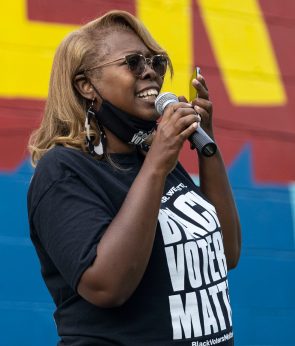
WASHINGTON — The Supreme Court early this morning gutted the little that is left of the Voting Rights Act of 1965 by upholding two racist election laws enacted in the 2020 battleground state of Arizona that make it much more difficult for minorities in that state to vote.
The ruling said essentially that any changes states make in the manner and timing of voting and placement of polling places among many other things are completely immune from challenges under the historic 1965 Voting Rights Act. Challengers said it was appropriate to sue on the basis of the Voting Rights Act because the Arizona laws in question make it harder for minorities to vote. The court’s majority said that those challenging the law did not prove that the intent of passage of the laws was discriminatory.
That leaves open the door a tiny bit for those challenging laws in other states but essentially leaves supporters of voting rights no other choice but to fight for and win passage of the Voting Rights laws now up before the Congress, laws that have been passed in the House but that are held up in the Senate.

“This is an outrageous and disappointing decision. We must have the For the People Act and the John Lewis Voting Rights Act passed into law,” LaTosha Brown, chair of Black Votes Matter, declared on national television almost immediately after the ruling was announced.
The ruling was Part II of the destruction of the Voting Rights Act started by the Supreme Court in 2013 when they ended the practice of jurisdictions with a history of discrimination having to get changes in their election laws pre-cleared by the Justice Department. They left in place a provision that still allowed lawsuits against state laws if those laws discriminated against minorities. The ruling this morning guts even what they left in place back in 2013, making it all but impossible to bring those lawsuits going forward.
Civil rights groups were hoping the Supreme Court would use the Arizona case to strengthen their ability to challenge the dozens of post-2020 voting restrictions imposed by Republican legislatures in the wake of Donald Trump’s defeat. “We have no choice now but to fight harder than ever for the John Lewis Act and the For the People Voting Rights Acts,” Brown reiterated this morning.
The 6-3 ruling Thursday, which was split between the conservative and liberal justices, said Arizona did not violate the Voting Rights Act when it passed a law in 2016 allowing only voters, their family members, or their caregivers to collect and deliver a completed ballot. The court also upheld a longstanding state policy requiring election officials to throw out ballots accidentally cast in the wrong precincts. (Challengers noted that the right to vote for someone running for national office including the Congress, the Senate, and the Presidency is taken away unfairly if someone votes in the wrong precinct which might be only the other side of a local street.)
Lawyers for the GOP controlled Arizona legislature said they wanted to prohibit “unlimited third-party ballot harvesting,” calling the racist law a “commonsense way to protect the secret ballot.”
Opposition to alleged “ballot harvesting” amounts essentially to stopping Black and other minority voters from campaigning for their preferred candidates and campaigning for people to actually cast ballots for their preferred candidates. It should not have been difficult for the Supreme Court to see that this is a part of democratic elections in many countries around the world. It is especially shocking coming from a court that had no problem allowing unlimited amounts of anonymous dark money to be used to elect candidates. When people help people vote it violates secrecy, they say, but when corporations secretly fund and control election outcomes it is just fine with the Court.
Challengers of the racist Arizona laws had argued that minority voters are more likely to need help turning in their ballots. In many states where ballot collection is legal, community activists offer it to encourage voting, they pointed out.
A federal judge in Arizona had rejected the challenges brought by voting rights activists but the 9th U.S. Circuit Court of Appeals reversed the decision, so the state appealed to the Supreme Court.
In the past, the Voting Rights Act mandated that states with a history of discrimination get permission from the Justice Department before changing election procedures, the test being whether the change would harm minority voters. But in 2013 the Supreme Court gutted the law by destroying that preclearance requirement, ruling that Congress failed to properly update the formula for determining which states should be covered. The Voting Rights laws before Congress now would solve that problem by updating the requirement by making it apply to all states.












Comments